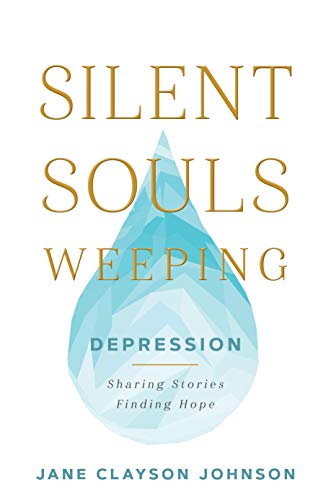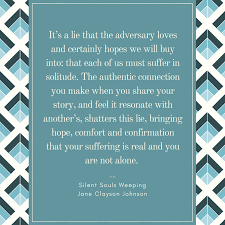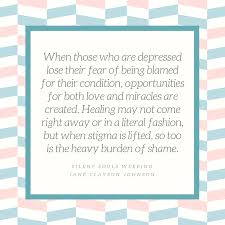Depression and mental illness are topics that are rarely talked about openly in our church. Aside from Elder Holland’s path breaking talk in 2013, we rarely hear sermons devoted to the topic. And when the Church does address the topic, it often focuses on its more extreme manifestations such as suicide attempts, rather than the day-to-day or hour-by-hour struggle that so many endure. The unfortunate side effect has been that shame and stigma has clouded this disease and made it harder for those who suffer to get the care they need.
Enter Jane Clayson Johnson’s revolutionary new book: “Silent Souls Weeping: Depression – Sharing Stories, Finding Hope” that was recently published by Deseret Book. Clayson Johnson is a celebrated journalist who has interviewed presidents and prime ministers. She is also the mother of two children. Yet, while everything outwardly appeared to be going well in her life, she suffered a serious depressive episode. Her recovery led her to want to shed light on the topic of depression which is such a taboo in our Church. She therefore set out to interview over 150 people who have either suffered from depression or helped those suffering from the throes of the disease.

This is a very important endeavor. As one of the people she interviewed told her, ”
“Depression thrives in secrecy, but shrinks in empathy.”

There are so many stigmas that unfortunate still surround mental illness and sunlight is needed to help to banish these myths and falsehoods. These myths are unfortunately still present among us. Just a few months ago, for instance, I heard someone in my ward suggest that anyone who is struggling from depression should be able to just get out of it if they buckle down and study the scriptures more. Such advice is not only false, but deeply counterproductive.
Other myths dismantled in this book include: The idea that those who suffer from mental illness are weak, the notion that talking about depression or mental illness will create more of it, the idea that those who are depressed must be sinful, and the idea that depression cannot strike those who are talented and successful.
Clayson Johnson’s book begins with her own story. She then focuses her sights first on two overarching themes which recur again and again throughout the remainder of the book.
First, feelings of shame, guilt, and toxic perfectionism are a “corrosive cocktail” that breed depression. This is the first reason that the advice that was offered in my ward is unlikely to produce the desired results. Those who suffer from depression are likely to feel great guilt,anxiety, and shame at their inability to fix their own mistakes. Relying on such advice, they may even think that if they cannot handle their illness themselves that they are failures in the eyes of God. We would never tell someone with another health condition like heart problems or diabetes that they merely need to take better care of themselves and that if they cannot get better it is their fault. And yet, we are sending that message to those who suffer from mental illness. That is deeply tragic

Second, those who are in the midst of depression often struggle to feel the Holy Ghost. This is not because of sin or transgression, but because depression makes it difficult to feel that still small voice. The inability to feel the spirit exacerbates depression by making those who suffer feel forsaken or unworthy. Well meaning individuals who urge depressed people to just read and pray more, are inadvertently making the situation worse.
Clayson Johnson then focuses on the manifestations of mental illness in specific contexts. She devotes a chapter to depression among the youth of the Church (including LGBT youth), depression among missionaries, postpartum depression, and suicidal depression. The chapter on missionaries in particular was revelatory and hit close to home. When I served as a missionary, I was assigned to train a missionary who suffered from depression. I wish I would have had access to this book before I served. I know that I could have done a much better job showing love, empathy and compassion had I been more familiar with the signs of depression.
The good news, according to Clayson Johnson, is that there is hope amidst mental illness. Psychiatric drugs in conjunction with counseling and other life style changes can dissipate the darkness. While those who have mental illness may have their illness chronically recur, they can nevertheless be healed and strengthened.
Throughout, Clayson Johnson provides examples of members of the Church who led with empathy and compassion, from loving bishops and mission presidents to spouses and friends. She further devotes one of the last chapters to the theme of what friends and loved ones can do to support those who struggle. Clayson Johnson’s message is a clarion call to all of us to rise up and better help those who struggle with depression.
I truly cannot recommend this book more highly. Perhaps my only critique is that there are a few areas where I would have liked to see more. I would have liked to have even more discussion about how we as member of the Church can make a difference in the lives of those who suffer. I also thought that Clayson Jonhson could have perhaps spent a bit more time talking about the process of recovery from mental illness and what recovery actually looked like in the lives of those she interviewed. I also would have liked to see a chapter on those who have left the Church as a result of mental illness, because I think that perspective would have been very valuable. But don’t let any of those nitpicks detract from this wonderful work.
This book had an enormous impact on me. I am so grateful for all of the work that Clayson Johnson put into her many interviews. I am grateful for those who opened deeply personal stories up to the public. This book has truly inspired me to try to be more compassionate, empathetic, and loving to those around me who may be struggling.
I think this book should be required reading for newly called bishops, and for anyone else who helps to minister or care for those who struggle with mental illness. If members of the Church throughout the world took this book to heart, then we would be so much better equipped to combat mental health issues that arise.
Clayson Johnson has done a couple of great podcast interviews in the past few weeks, so if you want to hear a preview of all of the great content in this book, check these out.


Jane Clayson is wonderful – and I appreciate your pointing out lots of the positives of her book, Daniel. With all due respect, though, I’d like to share another perspective. When I asked my relative who is serving as a mission president what she thought of the book, she said it “left her feeling depressed.”
There are reasons for that, I think. I’m a depression researcher – and I’m well aware of how crucial it is that we share a message of hope and healing. However for reasons that are not always easy to understand, there are many people who have fully embraced the messages Clayson underscores who have not found themselves substantially healed, especially over the long-term.
Although incredibly well-intentioned, what Clayson lays out in the book has little substantive difference from what Elder Morrison also taught over the years prior to Elder Holland’s talk. Elder Morrison, a wonderful man I visited with personally during my own dissertation on depression, was also deeply influenced by his former training as a pharmacy student. And that led him to emphasize the central and primary role of medications in people finding relief from depression – clearly interested in encouraging the Saints to accept treatment (that he sincerely hoped would allay suffering).
As medical treatment has expanded nationally (and in Utah) over recent decades, however, rates of depression, anxiety and suicide itself have continued to increase – even dramatically. This has contributed to greater critical awareness in the larger public and professional discussions of ways in which (especially over the long-term) medications can inadvertently make things worse (especially for the subset of people who struggle to metabolize them well). Every single one of the long-term studies on antidepressants I’ve ever reviewed (20+) show this same pattern over the aggregate (see here: http://unthinkable.cc/long-term-evidence-we-cant-ignore-anymore-anti-depressant-outcomes/)
This isn’t to deny that medications can be a helpful boost for some (especially in the short-term and as part of a comprehensive plan)…more so to caution about the glory story that has led long-term use that has become normal – and led us over recent years to significantly increase treatment with our youth. [This is also not medical advice at all – which should only come from a medical doctor. In *no* case should someone make changes to dosages or stop taking them without appropriate supervision].
It’s also become clear to many over time that “stigma busting” campaigns (first proposed by the pharma-funded group NAMI) were originally conceived to help people embrace treatment. I’ve come to believe that in a lot of cases the stigma people feel about a message of “this is just a brain problem and has nothing to do with your actions” is because something inside us doesn’t feel quite right about that!
While it’s absolutely true that deep and lasting healing is possible (with SO many things people can do to help that happen), some of the messages Clayson shares might not move people in that direction. My two cents. Thanks for hearing me out.
p.s. For people looking for additional support in moving towards more sustainable healing – I’d recommend they check out JoinLift.com, a new platform offering lots of free support.
For what it’s worth, my corner of the Church talks about depression all the time. In fact, we had a Relief Society activity just this month where a therapist in the ward addressed depression.
Another factor that has been discussed her at M* is that mountain elevations are correlated with a lack of the neurotransmitter stuff that allows you to be happy. So chemicals that block other things to let this neurotransmitter “work” aren’t as effective in mountain elevations. But mountain folks (despite being depressed) are very productive. Sea-level folks (though “happy) tend to be less productive.
I also appreciated Jacob’s post on his unthinkable.cc webpage that highlights that depression medications are known to cause suicidal ideation. This shouldn’t be a surprise to anyone who actually reads the fine print or talks to their doctor or even just listens to the medical patter behind the happy pictures of functioning people having fun during depression med commercials.
I like mindfulness, which (in my experience) encourages you to observe your thoughts and feelings as separate from your being. Feeling depressed or thinking about self-harm can thus be externalized and we can see these things as trials being experienced by a precious and loved child of God.
As one who has a plethora of family members dealing with depression, my experience is admittedly anecdotal. But it runs thus: medication won’t fix you, in that medication won’t “make” you happy. Medication just brings you back to the baseline. You’ve got to figure yourself out from there.
So as I see it (or at least how it has seemed to work in my family), there’s validity to the notion that you have to do some personal work to make yourself happy. And when I’ve seen people fail to get better, it’s primarily been because they don’t know how to pursue happiness once they’re leveled out by meds. So there’s a role for ongoing therapy in addition to medication: meds bring you to the starting line, a therapist/support system/loving family helps you learn how to get moving once you’re there.
Lattertarian, I’ve never heard it expressed better. Thank you.
“Depression and mental illness are topics that are rarely talked about openly in our church.”
Until about a decade ago, sure. In my stake at least, depression and mental illness are front and center. Two of the last four stake conference addresses our stake president has delivered have been on this topic, and it’s been a frequent EQ topic as well.
I’m glad we’re talking about it, but I’m not sure talking being open about it has decreased trend. And I believe that’s because we’re talking about the wrong things (but that’s a comment for another post).
As a few others have commented, pills are a good short-term stabilization fix, but we’re wrong to rely on them too heavily. In addition to talking more about behavioral, cultural and environmental factors, we should also not be afraid to dig honestly into the causes for what seems to be a serious uptick in depression and mental illness.
While I found the book to be wonderful and applaud its author, I am concerned that we do not then draw the conclusion that all mental illness is treatable. It is not. And for some of the mentally ill within our Church, we need some serious conversations about what the symptoms are and how not to let the bishops counsel these people or treat the serious behavioral problems with the discipline of Church courts. All this does is add to the despair felt both by the mentally ill and their families. And often leads to the destruction of their eternal families.
The truth of mental illness is hard enough without compounding it with ill-informed statements from those in positions of authority.
One of the general authorities used the story of my former spouse within an Ensign article designed to warn others about the slippery slope of sin. The trouble was, the general authority never bothered to ascertain that my former husband was mentally ill and this story was much longer and would have clearly demonstrated this illness if the general authority had asked some basic questions or followed up by interviewing anyone else who was there when this was happening. But the short, inaccurate version made for a great object lesson to warn the youth of the Church. So he told what his predispositions pointed him toward. The damage has been incalcuable.
Hi Gail,
I applaud the modern trend, where carefully researched stories are more often the norm.
I had a friend who was a tennis player in his youth. One day in a Church lesson, he realized that the faith promoting story of a young athlete who refused to play on the Sabbath had been taken from a casual mention of his actions in a group that happened to include whoever contributed to writing that Church manual.
This is nothing like the damage done in the case of your husband. But this pattern of simplifying and anonymnizing stories was a pattern of the past that I hope we are moving to discard, as a Church.
For example, I appreciate that the stories told in the most recent conference appear to be about individuals who are identifiable, such as Elder Godoy and the father of whom Elder Holland (who was clearly admired and honored by the speaker who followed Elder Holland).